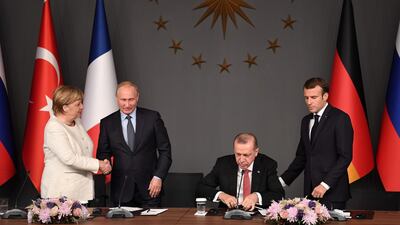A “complete cease-fire,” an “inclusive Syrian-led and Syrian-owned political process” and “safe and voluntary return of refugees” were some of the phrases uttered by Turkish and European leaders at a summit in Istanbul on Saturday, aimed at laying the groundwork for a peace process in the devastating civil war in Syria, now in its eighth year.
But the outcome of the Istanbul summit, which was chaired by Turkey’s Recep Tayyip Erdogan and included Russia’s Vladimir Putin, Germany’s Angela Merkel and France’s Emmanuel Macron, has offered little in the way of practical solutions to end the bloody conflict, succeeding only in highlighting Washington’s absence and greater European involvement in peace talks.
The talks came a month after Turkish shuttle diplomacy succeeded in temporarily halting a major offensive planned by the regime of Bashar Al Assad and backed by Moscow to reclaim the province of Idlib, the last redoubt of the opposition fighting to overthrow Syria’s strongman.
Fears of a humanitarian catastrophe that would send a new influx of refugees into Turkey and Europe had spurred a frantic effort to delay the battle, and those concerns are reflected in Paris and Berlin’s growing involvement in the peace talks, as they try to fend off political challenges from the anti-immigrant far right across the continent.
Turkey already hosts more than three million refugees, while Germany has accepted more than half a million.
The talks were billed as an auxiliary to the Astana peace talks, led by Russia, Turkey and Iran, and which have eclipsed the UN-led peace process. But even Astana has failed in its attempts to halt the violence, despite the involvement of the powers with the greatest presence and influence on the ground in Syria.
Inch by inch, the Syrian government – backed by Russia’s air force and Iranian-supported militias – has ousted the rebels from strongholds in Aleppo, the Damascus suburbs and southern Syria, exiling opposition civilians and fighters to Idlib and gathering momentum for a military victory in the war.
Europe has little leverage over the final outcome of the crisis, save for a pledge that ties any reconstruction aid to rebuild the devastated country to a credible political process. European leaders, however, are keen for a deal that allows the return of refugees, despite the persecution they are likely to face at home.
Far from setting the stage for peace talks, however, the summit highlighted how little progress has been made towards an inclusive peace process, what with Syrians absent from the meeting.
At the summit, President Putin insisted that the Idlib ceasefire deal, which had created a demilitarised zone on the province’s borders, was only a “temporary” measure, raising the prospect once again that Moscow may ultimately back a military campaign to retake the region and highlighting the fragility of the deal negotiated by Ankara.
The creation of a constitutional committee meant to draft Syria’s post-war charter is frozen. The outgoing UN envoy to Syria, Staffan de Mistura, had billed the committee as a key concession from the regime, and vowed to make progress in appointing its members, who are supposed to include representatives from the regime and the opposition as well as UN appointees, before leaving his post in November.
But he was rebuffed by the Syrian government earlier this month, in a move that showed President Assad felt little need to compromise with the opposition or the international community amid his military victories. The drafting of the constitution is supposed to pave the way for elections, steps that European leaders are insisting on – for now.
“There will be no real, sustainable, credible return of the refugees if the political process is not initiated,” President Macron said.
_________
Read more
ISIS kills 68 US-backed fighters in eastern Syria
Yazidi mothers of children by ISIS face heartbreaking choices
Turkey, Russia, France, Germany say Idlib ceasefire must be safeguarded
________
That political process now is in the hands of Russia, the Assad regime’s main backer, whose intervention in the war almost exactly three years ago reversed the momentum of the war at a key moment, when it looked like the government was teetering on the brink. Without military backing and political cover from Russia, President Assad’s fate had looked uncertain.
And without Russian pressure, President Assad sees little need to concede on any of the key pillars of the peace process touted by the other three powers in Istanbul. The meeting, far from emphasising the multilateral nature of peace efforts, served instead to highlight Russia’s primacy.
President Macron said the three powers relied on Russia to use its influence on President Assad. President Putin, rather than saying he would pressure the Syrian leader to come to an agreement with his opponents, said Moscow reserves the right to actively aid President Assad’s efforts to “eliminate this terror threat.”


